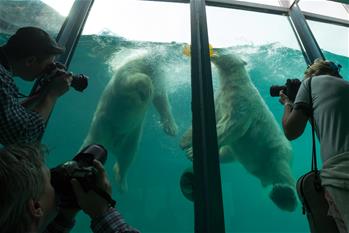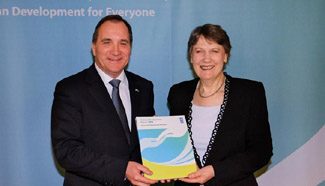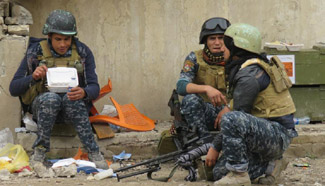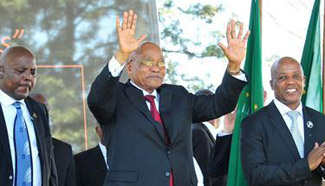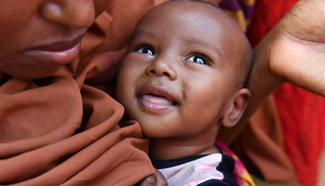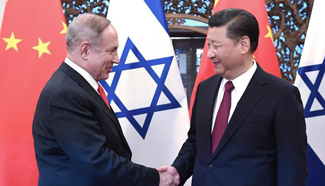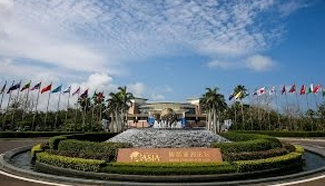MOSUL, Iraq, March 22 (Xinhua) -- Mohamad Arvold, 15, stands alone in a crowded refugee camp in Hamam al-Alil area, 15 km south of the war-wracked city of Mosul, Iraq, watching people passing by around him and trying to find someone in the crowd.
Unlike other teenagers of his age playing together, the boy fled the city of Mosul four days ago. He said he could not find his parents and siblings, who might still be trapped in Mosul.
"I miss my parents, brothers and sisters. I hope to see them soon," said Arvold, who looked despondent.
The boy lived in western part of Mosul, a hustling and bustling old city with a heavy population of 2 million. His family's quiet life was disrupted when the Islamic State (IS) occupied Iraq's second largest city in 2014.
At that time, Arvold was in primary school. He said that the IS terrorists controlled the school and forced the students to accept extremism ideas.
Worse, Arvold said the IS militants killed many people, for simply no reason. The boy hated the IS so much that he quitted school.
The fall of Mosul and the atrocities of the IS shocked the world.
Under pressure both domestically and abroad, the Iraqi army launched in October 2016 an offensive to liberate Mosul, bisected by the Tigris river into eastern and western parts, and gained control of eastern Mosul in January.
On Feb. 19, Iraqi Prime Minister Haider al-Abadi announced the start of the battle to expel IS extremists out of western Mosul. Recently the government said it has retaken around 30 percent of the area from Islamic State militants.
But the battle for the western Mosul is tough.
The area is very congested, making it a challenge for the Iraqi army to avoid civilian casualties in a conflict where rebel fighters took refuge among the civilians and sometimes hid behind them.
As fighting between the Iraqi government forces and the IS militants became more intense, civilians were evacuated by the Iraqi troops.
More than 150,000 people have fled their homes in western Mosul. Two-thirds have found shelter in camps near the city, according to Iraq authorities.
But the UN refugee agency estimated that there are still 700,000 civilians trapped in western Mosul.
Government forces have been besieging the city for several months. The civilians who remain face dwindling supplies of food and fuel. Many of them have already ran out of food.
For them, evacuation to a safe place with food became difficult as the IS militants are holding most of them hostage or as shields. Those who attempt to flee will have their hands cut off or even be beheaded if they are captured.
To escape attention from the IS militants and flee their home safely, Arvold and his family made an evacuation plan and fled separately to safe areas in several batches.
Arvold's elder brother was the first to leave and then Arvold. His parents and younger siblings temporarily chose to stay at home.
"To avoid the IS militants' track, we didn't dare to walk on the city road. Instead, we chose to circle around the outskirts of Mosul into the Gobi desert," Arvold said.
After a nearly four-hour trek, exhausted Arvold fled the IS-controlled area and finally arrived at the government-occupied Hamam al-Alil town.
Here the boy had hoped to reunite with his family, but so far he has found only one of his uncles.
Arvold was told that his parents and younger siblings are still trapped in western Mosul as the IS militants have enhanced their control of the area. Arvold's elder brother successfully fled away and now settled down in a refugee camp 60 km south of Mosul.
As the boy talked to us, raindrops came down.
We follow him to his tent where pans and bowls are put on the ground.
"I really miss my family," Arvold said, sitting on a carpet."But I don't want to go back to Mosul. It's too dangerous there," he added with a bitter smile.
The rain became heavier and beaten against the window strongly.
"I will go back to school to finish my degree in the future. I want to become a teacher to give more Iraqi kids access to education," Arvold said as he listened to the sound of rain outside.
"By that time, I will tell them what the IS had done to us and what we had to suffer," the little boy said, "I hope kids will no longer experience suffering like mine in the future."

